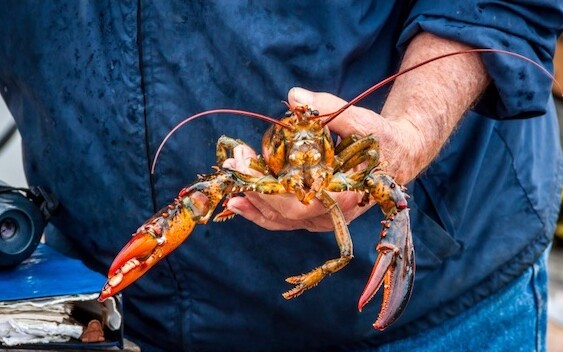A group of Northeast seafood processors have developed a project to help reduce the danger of endangered North Atlantic right whales entangling in the U.S. and Canadian lobster fishery.
In a Jan. 10 statement, backers of the new “Fishery Improvement Project (FIP)” said they have support of retailers and are working in collaboration with fisheries experts and non-government organizations. Their newly formed Fishery Impact Fund was approved by FisheryProgress, an online organization drawn from the seafood industry, environmental and social NGOs. Their website “provides information on the progress of global fishery improvement projects, and serves as a resource to retailers and other seafood buyers to evaluate the credibility and robustness of FIPs.”
One key backer is Northern Wind LLC, a New Bedford, Mass., producer of high quality fresh and frozen seafood.
“Our retail and food service clients are committed to supporting the North American lobster industry, but expressed concern that the fishery addresses whale entanglement risk,” said Ken Melanson, the chairman and founder of Northern Wind. “This fishery improvement project will give participants in the lobster fishery the information they need to avoid setting traps in areas where whales are known to be, or expected to be. This puts our industry ahead of the curve to maintain lobster harvesting, while addressing entanglement concerns.”
The industry participants in the FIP began by reviewing historical and current whale migratory patterns, using the New England Aquarium’s publicly available WhaleMap web application.
“By comparing fishing locations and harvest times with known whale migratory patterns, industry participants are able to understand how strong avoidance measures can be implemented while minimizing negative impacts to the lobster fishery and seafood markets,” according to the Fishery Impact Fund statement.
The participating companies are now evaluating their supply chains and building electronic traceability systems. Pairing that traceability data with whale tracking data will allow seafood companies to recognize entanglement risks, and develop harvesting strategies to avoid that risk.
“The FDA’s Food Modernization Act, which mandates electronic traceability, will be addressed using this technology,” said Melanson. “The approval of this project will provide buyers and processors with a pathway to develop internal sustainability policies, and to develop programs and procedures that foster and encourage sustainability.”
“It will allow large retail and food service buyers to continue to source from the fishery while the fishery is working to add additional protections beyond management measures in the overall effort to protect the critically-endangered North Atlantic right whale,” said Melanson.
Using spatial and temporal mapping of both lobster fishing effort and right whale locations will help processors and fishermen understand the effects of avoiding conflicts, say organizers, and that use of mapping analysis can be combined with the ongoing development of on-demand lobster fishing gear – so-called pop-up buoys for retrieving traps, without using vertical lines to buoys that can lead to whale entanglements.
That combined effort can allow fishermen “to plan their future needs around the deployment of on-demand gear, as the cost of ropeless gear decreases and it becomes economically viable for widespread use.,” project backers say.
The non-profit Fishery Impact Fund initiated work on the FIP with funding from Northern Wind LLC, Legit Fish Inc., and a grant from Massachusetts Division of Marine Fisheries.
As the three-year project moves forward, it will be co-funded by the lobster processing sector and through technology and gear innovation grants.







.jpg.small.400x400.jpg)